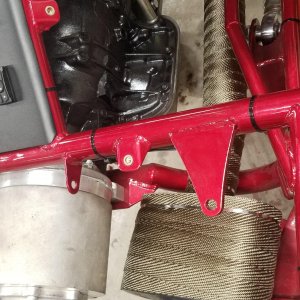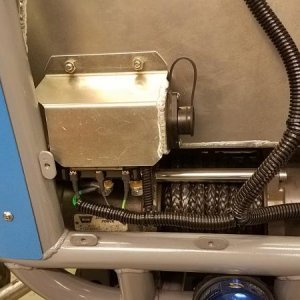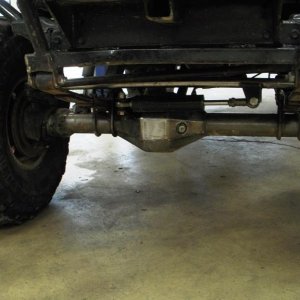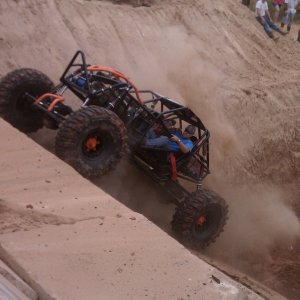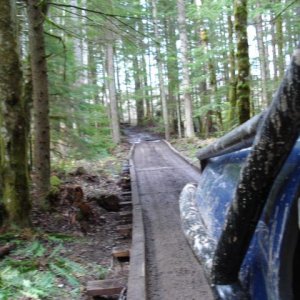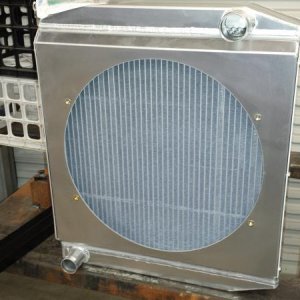How often do you change the coolant in your self contained tigs? My Synchrowave 250 dx miller is acting up while welding aluminum, my welder repair man is led to believe that the coolant "might" be contaminated, he says he checked everything else out and the machine checked out fine. The problem is when you strike an arc it will blow a hole through the work piece. You can turn the amperage as low as you want but when you strike an arc the voltage goes crazy.
-
Help Support Hardline Crawlers :
You are using an out of date browser. It may not display this or other websites correctly.
You should upgrade or use an alternative browser.
You should upgrade or use an alternative browser.
Tig welder coolant?
- Thread starter Elliott
- Start date
stuftmunky2k
Well-Known Member
I don't see how coolant would do that since the coolant only runs threw the torch to cool it and has nothing to do with the electrical part of it. one way to eliminate the coolant question is to just not turn on the cooler and try it as an air cooled torch, But DO NOT weld for a long period of time as it will burn up the torch. just check it and see if it still does it. Have you checked all your connections? torch, cables at the machine, and your ground? Assuming you have the machine on the right settings? I would just double check everything make sure your settings on machine are right then check cables then torch.
Everything is right and everything has been checked by me and him, he hooked it up to a load bank machine and it worked fine when hooked to it. And you can't turn my coolant off to my knowledge, And the coolant according to him does run into a couple of the electrical components. When he checked the coolant with a meter it checked almost as bad as regular water. The guy that was working on it seemed to be pretty sharp with welders and electrical components in general, but he just took some kind of gravy job with Lincoln so I'm stuck fixing it for now. I'm just curious if anyone else has seen this problem before.
stuftmunky2k
Well-Known Member
I run a dynasty 200 at home never had an issue and run a maxstar 280 at work never seen it happen. best of luck
Toddy
Well-Known Member
I have mine hooked up to the water hose. Just run other end outside. Never had a problem.
I know miller makes there own coolant. Might be a cheap fix if that's it.
I know miller makes there own coolant. Might be a cheap fix if that's it.
mac5005
Well-Known Member
We run regular green ethylene glycol mixed 25% with 75% water in all of our tig machines.
6 dynasty 350s, 5 Lincoln square wave 355s.
Was instructed not to run Dex cool or other propylene glycol mixtures as it conducts electricity better and can corrode internal parts worse and faster.
Never once had a problem like you are describing.
It almost sounds like the machine is stuck in dc- and not switching to AC.
6 dynasty 350s, 5 Lincoln square wave 355s.
Was instructed not to run Dex cool or other propylene glycol mixtures as it conducts electricity better and can corrode internal parts worse and faster.
Never once had a problem like you are describing.
It almost sounds like the machine is stuck in dc- and not switching to AC.
joshuacrowe
Member
- Joined
- Sep 14, 2010
- Messages
- 18
I have been informed that some fluids used for coolants will contribute to internal parts getting eaten up also. I have used 30+ year old machines and I have used brand new machines while teaching and at work. I have used water, ethylene glycol, and Miller coolant. Most of the setups dont seem to care on the specifics. My personal Syncrowave quit cooperating shortly after I got it and ate up a torch power cable. The only change was to flush and replace the torch and fill with Miller coolant. Haven't had a problem in ten years or so.
Two things. HF is weird stuff and grounding of equipment, workplaces, and the work itself is often overlooked. Most of the time, it is not an issue. Some times it causes all kinds of weird stuff. I have seen strange stuff happen around a TIG work area. I know two places where every GFCI oulet has been messed up and I have seen thermostat controlled heaters try to start with each arc start. I worked at a place that had to build a seperate building for the offices and run a dedicated power service to it because every piece of electronic office equipment was damaged by HF when everything was in the same building and powered off the same line.
I do not understand all of it. I have done a fair amount of electrical work but I am nowhere near a pro. I know I have seen the importance of a perfectly grounded and controlled setup and I have always been instructed as such when working directly with Miller and other reps within the industry and at school.
Two things. HF is weird stuff and grounding of equipment, workplaces, and the work itself is often overlooked. Most of the time, it is not an issue. Some times it causes all kinds of weird stuff. I have seen strange stuff happen around a TIG work area. I know two places where every GFCI oulet has been messed up and I have seen thermostat controlled heaters try to start with each arc start. I worked at a place that had to build a seperate building for the offices and run a dedicated power service to it because every piece of electronic office equipment was damaged by HF when everything was in the same building and powered off the same line.
I do not understand all of it. I have done a fair amount of electrical work but I am nowhere near a pro. I know I have seen the importance of a perfectly grounded and controlled setup and I have always been instructed as such when working directly with Miller and other reps within the industry and at school.

